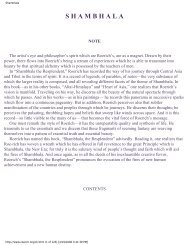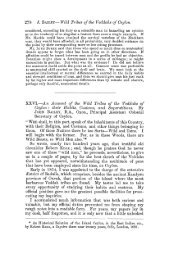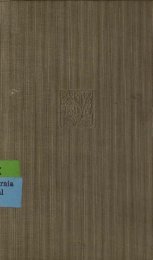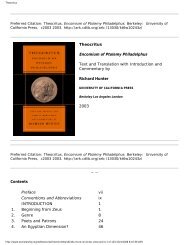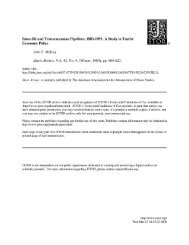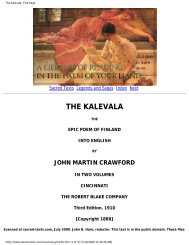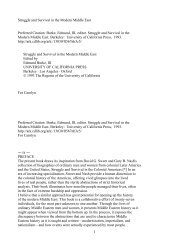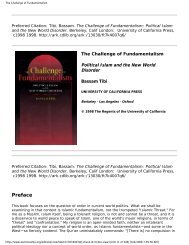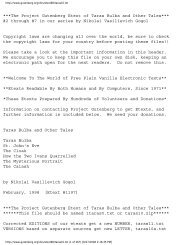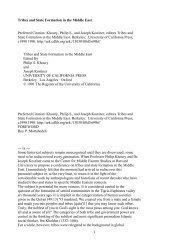Between Two Worlds Kafadar.pdf
Between Two Worlds Kafadar.pdf
Between Two Worlds Kafadar.pdf
Create successful ePaper yourself
Turn your PDF publications into a flip-book with our unique Google optimized e-Paper software.
dualism based on religious identity. Yet this does not preclude the possibility<br />
of friendship and cooperation with individuals from "the other world." It is<br />
always possible that those individuals will eventually join you and fight for<br />
the same cause, just as the warden declares himself Muslim more than halfway<br />
through the novella. And the author has no qualms about using the word gaza for<br />
the joint undertakings of the Christian and (freed) Muslim shipmates, including<br />
himself, under the chieftainship of the warden-captain as gaza even before the<br />
latter's conversion.<br />
This is only to be expected from proselytizing faiths, and is not surprising<br />
among Muslims, who did not need to be theologians to know one of the basic<br />
tenets of their faith, namely, that all human beings are born Muslim since it is<br />
the natural religion. (Only thus could the kul system flourish to the extent<br />
that it did. Through this system, thousands of non-Muslims from the fourteenth<br />
to the seventeenth century were enslaved or recruited, converted to Islam, and<br />
trained to function as kuls , or servants, of the House of Osman in the military<br />
and administrative cadres of the Ottoman state, including the highest positions.<br />
You could<br />
― 84 ―<br />
indeed trust these ex-infidels because once shown the true path of Islam, which<br />
accords with the innermost nature, the fitra , of every human being, they would<br />
follow it in accordance with their natural tendency.)<br />
It would be wrong to see only cold-blooded calculation toward future gains in<br />
those acts of cooperation. As implied by Barbarossa's gests, there must indeed<br />
have been those who appreciated the valor or scruples or skills or connections<br />
or humor or beauty or plain human warmth of others even if they were on the<br />
wrong side. Even the literature that was produced after the total and brutal<br />
rupture which followed the intense violence of the Anatolian war between Greeks<br />
and Turks in this century had room for complex relationships of hostility and<br />
affection, repression and solidarity, between the two peoples.[67]<br />
One should, on the other hand, not forget that they fought bloody wars after<br />
all. Complex relations developed, symbiosis and cooperation were possible, but<br />
over the long run people's behavior was, at least in part, shaped by or attuned<br />
to an either/or struggle. The two sides of the frontier had over the centuries<br />
molded overlapping planes of social and cultural interaction and lived, in<br />
certain respects, in more proximity to one another than to certain elements<br />
within their "own" societies. The frontier was a "veritable melting pot of<br />
religions, races, and cultures."[68] But in countering this kind of<br />
nonexclusivist vision to the nationalistic exclusivist depiction of medieval<br />
Anatolia,[69] one should not get carried away and forget that there were indeed<br />
two sides that fought one another on the basis of identification with this or<br />
that side. In an article that successfully delineates the biases of sources<br />
written from the point of view of sedentary peoples, Keith Hopwood, for<br />
instance, seems to nearly suggest that our perception of a pattern of conflict<br />
between the two peoples and their "lifestyles" derives solely from the<br />
misperceptions and skewed reportage of urban-biased historians of Rome,<br />
Byzantium, etc.: "the conflict between pastoralist and sedentary farmer is a<br />
76




